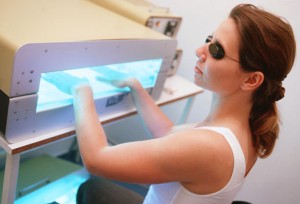What Is Psoriasis?
Psoriasis, is characterized by red and scaly skin on the palms of the hands and/or feet. Your doctor may suggest Phototherapy, also known as light therapy. It uses ultraviolet rays from artificial lamps, or lasers to slow the growth of your skin cells. That helps ease your symptoms.
Psoriasis Phototherapy with UVB
Ultraviolet B or UVB rays are prominent from sunlight, especially summer noontime sun. But no matter what the time of day, sunlight also carries UVA rays, which can lead to cancer and speed up aging.
Phototherapy is the use of ultraviolet (UV) light to slow the rapid growth of new skin cells. This is helpful in treating Psoriasis, because skin cells are growing too rapidly.
Two types of light : 1 Narrow-band UVB light. This exposes you to only the wavelengths of light, that work for treating psoriasis. 2 Broadband UVB therapy uses a wider range of wavelengths.
There are several types of psoriasis. Symptoms for each type may vary, but the major symptoms are:
- Raised, bright red patches of skin often covered with loose, silvery scales, usually on the knees, elbows, or low back.
- Tiny areas of bleeding when skin scales.
- Mild scaling to thick, crusted plaques on the scalp.
- Itching, especially during sudden flare-ups or when the Psoriasis patches are in body folds, such as under the breast or buttocks.
- Discolored or pitted nails.
Many doctors believe that psoriasis may be passed down from parents to their children (inherited). This is because certain genes are found in families who are affected by psoriasis. About one-third of people who have psoriasis have one or more family members with the condition.
Other factors that can contribute to the development of psoriasis include:
- Emotional or physical stress. Stress may causes psoriasis to appear suddenly, or make symptoms worse (although this has not been proved in studies).
- Infection. Infections such as strep throat, can cause psoriasis to appear suddenly, especially in children.
- Skin injuries. An injury to the skin, can cause psoriasis patches to form anywhere on the body, including the site of the injury. This includes injuries to your nails or nearby skin while trimming your nails.
- Smoking. Smoking may make you more likely to get psoriasis, and make the symptoms more severe.
Some people visit tanning salons as an alternative to natural sunlight. Tanning beds in commercial salons emit mostly, UVA light, not UVB. The beneficial effect for psoriasis is attributed primarily to UVB light. The National Psoriasis Foundation does not support the use of indoor tanning beds as a substitute for phototherapy. It is more prudent to be treated under a doctor’s supervision.
PUVA (Psoralen plus Ultraviolet A). This combines ultraviolet A lamp sessions with a drug called psoralen, which you take as a pill or put on your skin as a cream. The drug makes your skin more sensitive to light. You might hear your doctor call this type of treatment “photochemotherapy.”
PUVA is particularly effective at clearing up severe psoriasis quickly, and has long-lasting results. There are some side effects, though, including nausea, exhaustion, headaches, burning, and itching. Using PUVA over a long time can also raise your risk of skin cancer.
Ask your doctor if Psoriasis Phototherapy is a good option for you. Also, keep up to date about skin conditions.



